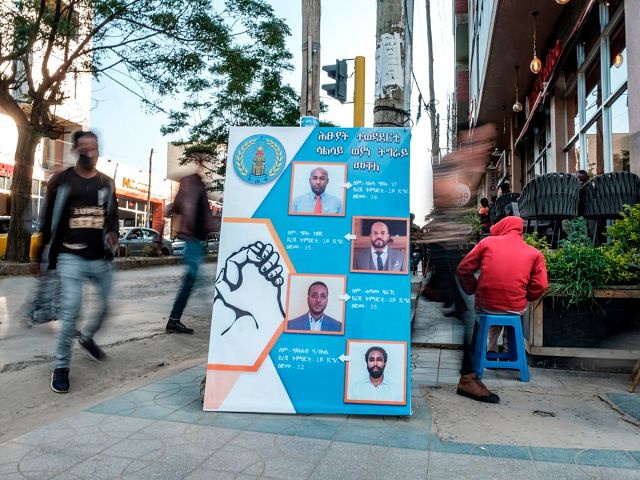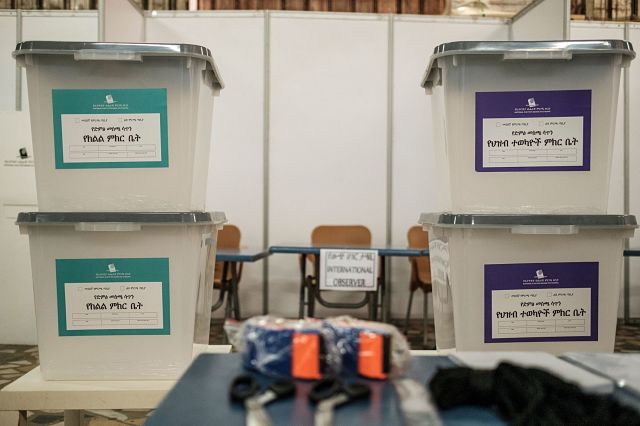 Polling material at a National Electoral Board of Ethiopia warehouse, in Addis Ababa. Ethiopia’s elections were delayed due to the coronavirus pandemic. (Getty Images)
Polling material at a National Electoral Board of Ethiopia warehouse, in Addis Ababa. Ethiopia’s elections were delayed due to the coronavirus pandemic. (Getty Images)
Bloomberg
Ethiopia’s elections board wants to hold the Horn of Africa nation’s first multi-party vote in late May or early June after delaying the exercise due to the coronavirus pandemic.
Consultations with civil society organizations are ongoing to fix an exact date, according to Solyana Shimeles, a communications adviser to the National Electoral Board of Ethiopia. The election in Africa’s second-most populous nation was initially scheduled for August.
“It is NEBE’s mandate to decide the election date based on the feedback it gets from different stakeholders,” she said.
Unrest has flared since Prime Minister Abiy Ahmed began freeing up the country’s once tightly regulated political space when he came to power in April 2018. Abiy has given room for opposition parties and rebel groups to operate, which critics say has stoked fragmentation and long-suppressed rivalries among ethnic communities.
—
Ethiopia Braces for Election Amid COVID19
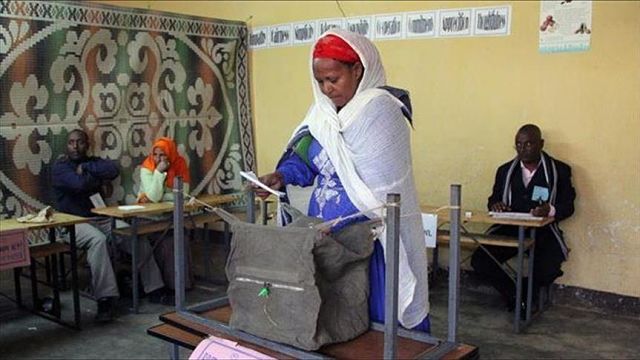
Health minister tells parliament country can hold parliamentary election after necessary precautions. (AA)
Updated: September 18th, 2020
Addis Getachew Tadesse | ADDIS ABABA, Ethiopia
Ethiopia may now be in a position to hold parliamentary election after taking precautionary measures against COVID-19, the health minister said on Friday.
Lia Kebede told an emergency session of the House of Peoples’ Representatives the country could now hold the parliamentary election provided all the necessary precautions are put in place against the spread of the coronavirus.
A landlocked country in the Horn of Africa, Ethiopia postponed its sixth parliamentary election twice due to internal conflicts and the COVID-19 pandemic.
Last week, in clear defiance of the federal authority, the north Ethiopian Tigray regional state conducted a regional election that was categorically rejected both by the National Electoral Board of Ethiopia (NEBE) and the House of Federation, the upper house of the parliament.
The minister said the nation built preventive capacities in mitigating the circumstances that might lead to the spread of the virus, the local broadcaster FANA quoted Lia as saying.
The country’s testing capacity, she said, increased as the ministry managed to conduct over 11.7 million laboratory tests, detecting 66,224 cases and recording 1,045 deaths.
—
Ethiopia Expects to Hold General Elections in Next 12 Months
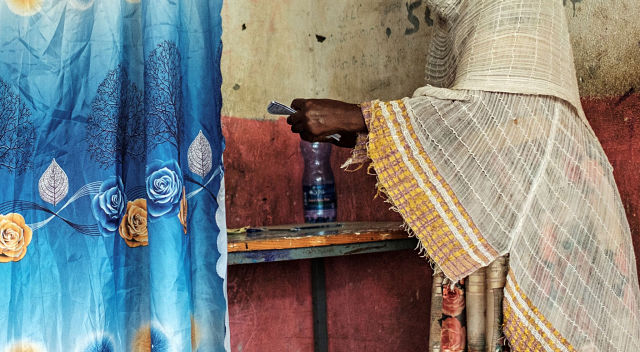
Ethiopia expects to hold general elections within the next year after a vote scheduled for August was postponed because of the coronavirus pandemic, PM says. (Photo: A woman prepares her ballot in a voting booth near Mekele on September 9, 2020. in an election that parliament has deemed illegal/Getty Images)
By Samuel Gebre and Simon Marks
Updated on September 10, 2020
Ethiopia Expects to Hold Delayed Elections Within Next Year
Ethiopia expects to hold general elections within the next year after a vote scheduled for August was postponed because of the coronavirus pandemic.
“I personally believe there will be elections in the year 2013,” Abiy said on state television on Wednesday. Ethiopia, with its own 13-month calendar that is about seven years behind the Gregorian calendar, celebrates the start of 2013 on Friday.
The ballot will be a test of reforms unleashed by Prime Minister Abiy Ahmed, who has been opening up the country’s once tightly regulated political space since coming to power in April 2018. His unbanning of opposition and rebel groups has stoked political fragmentation and long-suppressed rivalries among ethnic communities.
The 44-year-old premier has also pledged to open up state-owned industries, from telecommunications to energy, to increased foreign investment in one of Africa’s fastest-growing economies.
Abiy announced the new timeline for the election on the day that the nation’s Tigray region held its own parliamentary vote, defying a ban by the federal government.
Ethiopia became one of the first African nations to postpone elections because of the coronavirus pandemic when it delayed the ballot in March. Lawmakers voted to extend the government’s mandate until elections are held, from the previous Oct 10 deadline.
Authorities have had time to learn about the virus, and a vaccine will probably be available to protect people during the election, Abiy said, adding relevant institutions will make a final decision on a schedule.
—
Ethiopian Region Proceeds With Vote Banned by Federal Government
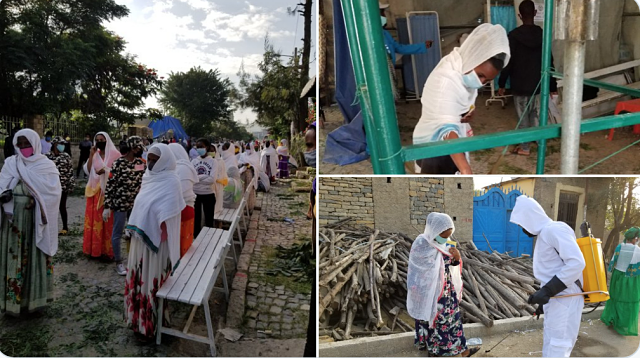
Voters gathered in Mekele on Wednesday for an election that has been declared unconstitutional by parliament, which had postponed the national poll due to the COVID-19 pandemic. (Photo: Twitter/@rcoreyb)
Updated: September 9th, 2020
Ethiopia’s Tigray region began holding an election outlawed by the federal government.
Polls opened at 6:00 a.m. in the northern Ethiopian region, said Abdel Guesh, a spokesman for the Tigray electoral commission. Voting will continue until 6:00 p.m., he said.
The ballot is a direct challenge to Prime Minister Abiy Ahmed’s administration, which postponed general elections earlier this year because of the coronavirus pandemic. It’s the latest in a series of challenges Abiy has faced since he began implementing political reforms two years ago in response to intensifying anti-government protests.
Tensions between the Tigrayan and federal authorities may spawn unrest that could jeopardize Abiy’s plans to open up the economy to foreign investment, according to the International Crisis Group. Some federal officials have said they’ll stop the vote, while the nation’s upper house of parliament on Saturday said the results won’t be recognized, state-controlled Ethiopian Broadcasting Corp. reported.
Depending on how far the dispute goes, it may push the ethnic Tigray group to consider “constitutional secession procedures, further raising the stakes and intensifying conflict risks,” the ICG said last month.
Lost Influence
Tigray’s ruling Tigray People’s Liberation Front was formerly the pre-eminent party in Ethiopia’s ruling coalition, after it helped oust the nation’s Marxist Derg regime in 1991. The party has set itself in opposition to Abiy, an ethnic Oromo, since he came to power in April 2018. In December, it refused to join the Prosperity Party he formed to replace the coalition.
Abiy played down the prospect of the election stoking instability.
“This merry-go-round should not be a headache for us,” he said on state television on Tuesday. “We are not going to lift our hands every time someone shouts asking to affirm their existence.” Security officials on Monday stopped journalists and observers from boarding a flight to Mekele, Tigray’s capital, without providing a reason. The authorities confiscated phones and laptops.
About 3 million people are expected to vote for representatives to Tigray’s 190-member parliament. The results are expected by Sept. 13.
—
Ethiopian Region Votes, Defying Federal Government and PM
By ELIAS MESERET
September 9th, 2020
ADDIS ABABA, Ethiopia (AP) — People began voting in Ethiopia’s northern Tigray region on Wednesday in a local election defying the federal government and increasing political tensions in Africa’s second most populous country.
Tigray officials have warned that an intervention by the federal government would amount to a “declaration of war.” They have objected to the postponement of the national election, once set for August, because of the coronavirus pandemic and the extension of Prime Minister Abiy Ahmed’s time in office.
Over the weekend, Ethiopia’s upper house of parliament called Wednesday’s election unconstitutional. Ethiopia’s leader has ruled out a military intervention, but there are fears any punitive measures by the federal government could further escalate tensions.
The standoff with the northern region is the latest challenge to the administration of Abiy, who won the Nobel Peace Prize last year in part for introducing political reforms. He took office in early 2018. The Tigray region’s ruling party, the Tigray People’s Liberation Front, was the dominant one in Ethiopia’s previous government.
“This election is illegal because only the National Election Board can conduct elections in Ethiopia,” Abiy said in an interview with the state broadcaster, EBC, on Tuesday evening. “TPLF’s rule over the region is extended until the upcoming election. If the party doesn’t take part in the general election, it won’t be acceptable.
“These types of small gatherings won’t be a headache for us,” Abiy added.
Some 2.7 million people in the Tigray region were expected to cast their votes at more than 2,600 polling stations, regional election officials said.
A regional broadcaster, Tigray TV, showed voters lining up in the early hours Wednesday. Two residents of the regional capital, Mekelle, told The Associated Press there was tight security in the city and surrounding areas. Bikes and auto rickshaws were banned from the city as of Tuesday evening.
On Monday, Ethiopian security officials removed reporters from a plane heading to the region, confiscating their I.D.s, cameras and other equipment. Separately, a non-governmental organization told the AP they were barred from observing the election “for no sufficient reason.”
The group, Seb Hidri, said the Tigray People’s Liberation Front was behind the ban.
–
Ethiopian Lawmakers Call Region’s Vote Unconstitutional (AP)
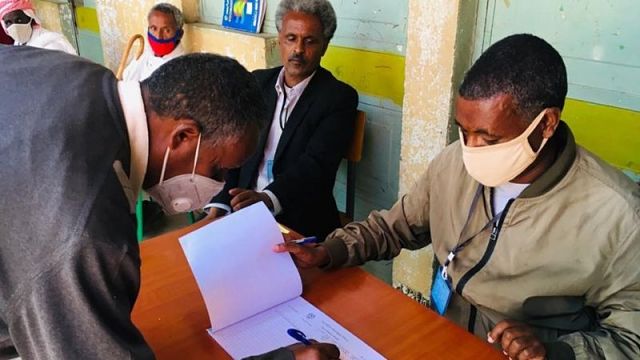
Regional officials in Tigray have opposed the year-long postponement of Ethiopia’s general election, once planned for August, and the continuation of Prime Minister Abiy Ahmed’s mandate beyond term limits. They have organized their own election for Sept. 9. The federal government has said the postponement relates to the COVID-19 pandemic and should be respected. (Getty Images)
By ELIAS MESERET
September 5, 2020
JOHANNESBURG (AP) — Ethiopia’s upper house of parliament on Saturday called elections planned next week in the northern Tigray region unconstitutional, amid a confrontation between the federal government and regional officials who have warned that any intervention amounts to a “declaration of war.”
“The decision by the House of Federation treats the act of the Tigray regional state as void from the very beginning,” legal expert Kiya Tsegaye told The Associated Press. “This makes the election unconstitutional and illegitimate. I think this decision will be the base for the next legal action by the federal government.”
Regional officials in Tigray have opposed the year-long postponement of Ethiopia’s general election, once planned for August, and the continuation of Prime Minister Abiy Ahmed’s mandate beyond term limits. They have organized their own election for Sept. 9. The federal government has said the postponement relates to the COVID-19 pandemic and should be respected.
Members of the upper house of parliament from the Tigray region boycotted its meeting Saturday.
The Sept. 9 vote will elect members of the regional parliament, which in turn will elect the region’s cabinet and administrators.
Ethiopia’s prime minister has ruled out a military intervention to deal with the confrontation, but there are fears that any punitive measures by the federal government could escalate tensions further.
The standoff with Ethiopia’s northern region is just the latest challenge to the administration of Abiy, who was awarded the Nobel Peace Prize last year in part for the sweeping political reforms since he took office in early 2018.
The loosening of the former government’s repressive measures, however, have opened the way for certain long-held grievances and requests by some regions for more autonomy. The former government was largely led by people from the Tigray region, exacerbating the tensions.
—
2020 Ethiopia Election Canceled Due to COVID-19
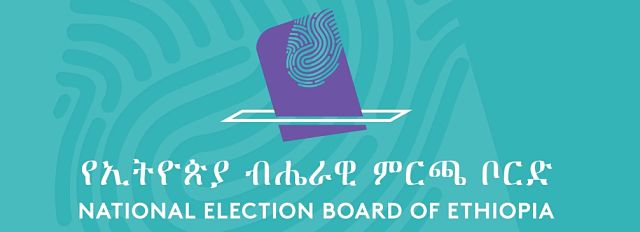
Photo Courtesy: @NEBEthiopia
Tadias Magazine
By Tadias Staff
Updated: March 31st, 2020
New York (TADIAS) — The highly anticipated 2020 national election in Ethiopia has been canceled for now due to the coronavirus outbreak.
The National Election Board of Ethiopia (NEBE) announced that it has shelved its plans to hold the upcoming nationwide parliamentary polls on August 29th after an internal evaluation of the possible negative effect of the virus pandemic on its official activities.
“After conducting detail assessment of the impact COVID-19 would have on its operation, NEBE decided to cancel the current electoral calendar and suspend elections operations of the coming national elections planned to be conducted in August 2020,” the Board said.
The 2020 national election was widely expected to be the first formal measure of public approval for Prime Minister Abiy Ahmed’s administration.
In its announcement NEBE did not provide an alternative date, nor is it clear how opposition parties will react given that the election is constitutionally required in order to renew the ruling party’s governing mandate.
Ethiopians around the world were hoping that 2020 would be the first transparent and credible election in the country’s history. During the last election in 2015 the incumbent party claimed to have won 100% of the vote.
This is a developing story and will continue to be updated.
After conducting detail assessment of the impact COVID-19 would have on its operation, NEBE decided to cancel the current electoral calendar and suspend elections operations of the coming national elections planned to be conducted in August 2020. https://t.co/TJxcf2jn1J pic.twitter.com/EFWqdzGhNN
— National Election Board of Ethiopia- NEBE (@NEBEthiopia) March 31, 2020
—
Related:
Ethiopia postpones major election because of coronavirus (AP)
Ethiopia Elections Postponed to August
2020 is Election Season Across Africa
Ethiopia Election 2020 Campaign Update
Ethiopia: Board commences election materials printing
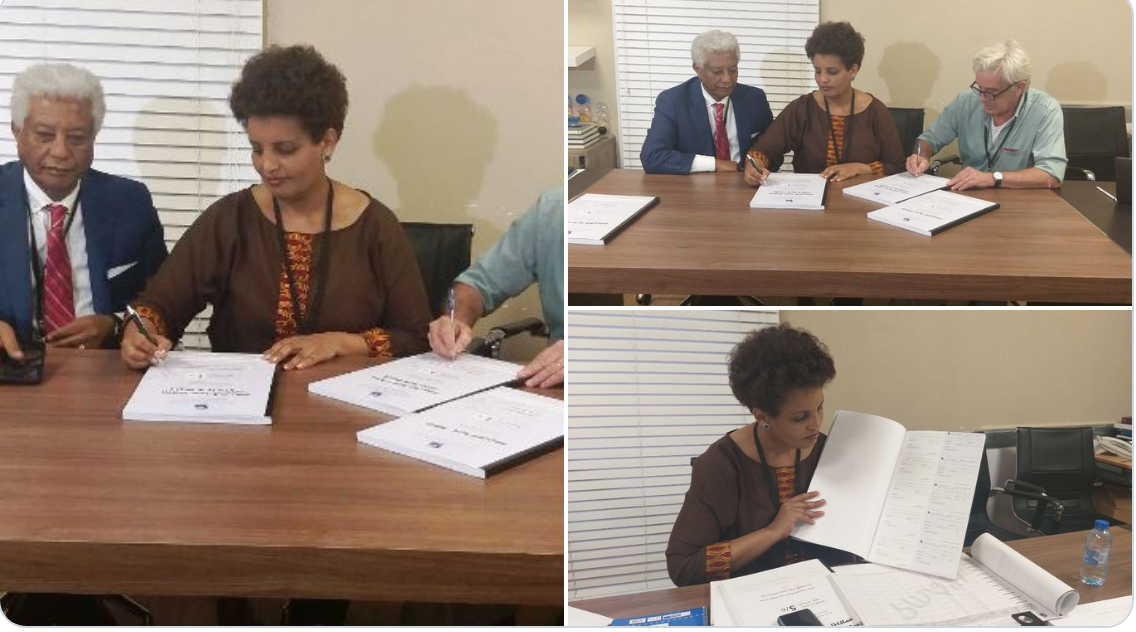
Electoral Board Making Preparations For 2020 Elections
#Ethiopia: Board commences election materials printing https://t.co/y5MIzcA57o pic.twitter.com/LXLJoB3zzH
— FANA BROADCASTING C (@fanatelevision) December 18, 2019
Efforts to End Ethiopia’s Ruling Party Draw Criticism from Within
Ethiopia braces for highly-anticipated parliamentary election in May 2020
Ruling Coalition Seeks to Further Unite Ahead of Vote
Prominent Abiy Critic Says to Stand in Ethiopia Election (AFP)
—
COVID-19 & Elections: Media Round-up From Ethiopia & U.S.
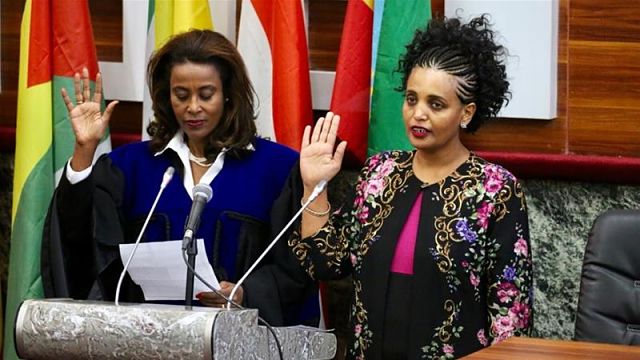
In Ethiopia the election has been postponed while the country has declared a State of Emergency due to the Coronavirus pandemic. (Photo: Birtukan Mideksa (right), the head of the National Electoral Board of Ethiopia, being sworn in on November 22nd, 2018)
Tadias Magazine
By Tadias Staff
Updated: May 18th, 2020
New York (TADIAS) – As Ethiopian Americans we were eagerly looking forward to two major elections this year, which directly impact our lives here in the U.S. as well as our communities back in Ethiopia. But that was before the COVID-19 pandemic turned everything upside down.
In just a matter of weeks the U.S. unemployment rate has gone from the best in 50 years to the worst since the Great Depression altering the conversation surrounding the 2020 U.S. election. And in Ethiopia the national election has been canceled for now while the country has declared a State of Emergency due to the Coronavirus pandemic.
The election delay in Ethiopia has also exposed an impending constitutional problem: What happens when the ruling party’s term of office expires in the next few months before an election is held? Interestingly, the historic legal predicament has also sparked a robust civil discourse in social media in regard to the role of the constitution as well as possible solutions for next steps, which is a pleasant surprise in comparison to previous election seasons. The timely and elaborate discussions include diverse and informative viewpoints from scholars, legal experts, journalists, civil society leaders, government advisors as well as politicians.
In the case of Ethiopia, the 2020 vote was supposed to be the first transparent and credible election in the nation’s history coming on the heels of prior highly contested election processes. In a statement announcing the decision in late March the National Electoral Board of Ethiopia (NEBE) said: “After conducting detail assessment of the impact COVID-19 would have on its operation, NEBE decided to cancel the current electoral calendar and suspend elections operations of the coming national elections planned to be conducted in August 2020.”
In a recent Facebook post Prime Minister Abiy Ahmed further warned that his rivals were “trying to exploit uncertainty created by the coronavirus pandemic to seize power, risking instability,” AFP reported, adding that the opposition was quick to push back asserting that Abiy’s comments amounted to “a threat to silence and intimidation.”
As AFP notes: “Ethiopia’s constitution does not spell out how the postponement should be handled — a situation which has stoked concerns that Abiy’s government may soon face legitimacy issues,” and this month “lawmakers in parliament’s lower house formally asked the upper house to provide a ‘constitutional interpretation’ that could offer a way out of the impasse.”
Meanwhile, in the U.S. several voter-driven and non-partisan initiatives are similarly underway across the country aiming to diversify the existing voting options for the 2020 election season including this campaign led by former first lady Michelle Obama who is pushing for voting by mail, early in-person voting, and online voter registration. Unfortunately, the White House has also created a firestorm after Trump advisor and son-in-law Jared Kushner indicated that he was ‘not sure’ that the November 3rd elections would be held as scheduled. The Washington Post reported that “hours after his remarks to Time Magazine generated a strong reaction on social media [last week], Kushner issued a clarification, saying he was unaware of and not involved in any “discussions” about changing the date of the 2020 election,” adding that “neither Trump nor Kushner as his adviser has any legal authority to change the timing of the presidential election.”
Americans are also openly discussing another potential concern – which the Washington Post describes as the “need to prepare for the possibility of Trump rejecting election results.”
Below are links to some of the latest online arguments and analyses taking place in Ethiopia as well as the Diaspora:
To resolve constitutional dilemma, interpretation is insufficient: by Girmachew Alemu
Ethiopia’s poll has been pushed out by COVID-19. But there’s much more at play: by Mulugeta G Berhe
Seeking constitutional interpretation: Not ideal but legitimate: by Yonatan T. Fessha
A constitutional path towards political normalization: by Mamo Mihretu
The limits of legal solutions: by Mehari Taddele Maru
Elections and emergencies show constitutional limits on states’ rights: by Brightman Gebremichael
Beating around the bush on the constitutional conundrum: by Adem Kassie Abebe
Ethiopian regions cannot hold elections without federal approval: by Markos Debebe
Ethiopia’s Impending Constitutional Crisis and why we need a political solution: by Jawar Mohammed
—
Join the conversation on Twitter and Facebook.





